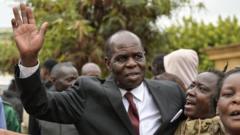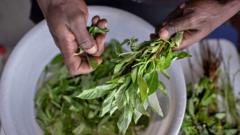Gilbert Deya, a prominent Kenyan televangelist infamous for his claims of creating "miracle" pregnancies, has died following a car crash that injured multiple individuals, including his wife and students from a bus. His controversial history included accusations of child trafficking, before being acquitted in 2021.
Controversial Kenyan Televangelist Gilbert Deya Dies in Car Accident

Controversial Kenyan Televangelist Gilbert Deya Dies in Car Accident
The notorious pastor known for claiming miraculous pregnancies perished in a tragic road accident, leaving a legacy of both hope and controversy in his wake.
Controversial Kenyan televangelist Gilbert Deya has tragically passed away following a car accident near Kisumu town in western Kenya. Reports indicate that Deya died instantly on Tuesday evening when his vehicle collided with a university bus and another vehicle. The crash left at least 30 others injured, including one individual identified as his wife, as well as several students aboard the bus.
Deya, who led a church in London, gained notoriety in the early 2000s for claiming to facilitate miraculous conceptions of "miracle" babies through prayer. Over time, his ministry became enmeshed in serious allegations linking his church to a child-trafficking operation. This led to his arrest and extradition from the UK around eight years ago after a protracted legal struggle. However, he was acquitted of these charges two years ago due to a lack of sufficient evidence.
The news of Deya's passing elicited responses from local leaders, including Siaya County Governor James Orengo, who expressed "deep sorrow and regret" regarding the tragic incident. He later confirmed that the accident involved a vehicle affiliated with the county. As Deya’s legacy is analyzed, it highlights the complex and often contentious perspectives concerning religious leaders in Africa, where claims of miraculous interventions clash against the backdrop of legal and ethical considerations.
This story not only reflects on the life of a controversial figure but also invites a broader conversation about the intersections of faith, law, and societal impact in contemporary African society.





















